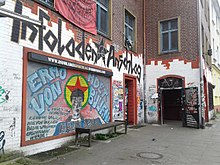Killing of Halim Dener
Halim Dener | |
|---|---|
 A memorial to Halim Dener in Bielefeld | |
| Died | 30 June 1994 (aged 15–16) Hanover, Germany |
| Cause of death | Shot dead by a police officer |
Halim Dener was a 16-year-old Kurdish boy shot dead by a German police officer in Hanover, on 30 June 1994. The Halim Dener Campaign commemorates the anniversary of his death.
Shooting[edit]
Halim Dener was a 16-year-old Kurdish boy who had been tortured by the Turkish military. He fled Turkey before his village was destroyed and he was living in Hanover as an asylum seeker in 1994. On 30 June, he went out at night to put up posters for the National Liberation Front of Kurdistan (ERNK), an offshoot of the Kurdistan Workers' Party (PKK).[1][2] The PKK had recently been banned in Germany as a terrorist group.[3] Dener was in the central Steintor pedestrian zone when he encountered several police officers.[1] According to the account of the police, what happened next was that he tried to run away and they restrained him. There was a scuffle and when a police officer tried to pick up his gun it fired, killing the boy.[1][2]
Later events[edit]

On the 20th anniversary of Dener's death in 2014, a proposal was made to rename a square after Dener, as a memorial. In the Linden-Limmer district, council members voted to do so, but the plan was then vetoed by the city council. The cancellation of the plan was controversial; one campaigner said "I don't think anyone would arrive at the idea that they wouldn't name a square after victims of fascism because that would upset neo-Nazis".[1] The Halim Dener Campaign continued to press for a memorial to Dener in the city, but Mayor Stefan Schostok resisted, saying he did not want to inflame tensions between Turks and Kurds.[2]
A mural painted to commemorate Dener in 1994 on a social centre in Bielefeld became subject to a three-year legal battle and was eventually declared in 2020 to be a work of art (and therefore not illegal).[4][5] In 2021, 300 people marched in memory of Dener and to protest recent police raids on a Kurdish social centre.[6]
See also[edit]
References[edit]
- ^ a b c d "Hanover decides against sign for teen shot by police". Deutsche Welle. 19 May 2017. Archived from the original on 12 November 2020. Retrieved 13 January 2022.
- ^ a b c Schmollack, Simone (29 June 2019). "Tod in Hannover: Eine Tafel, ein Platz, ein Stein [Death in Hanover: A plaque, a square, a stone]". Die Tageszeitung (in German). Archived from the original on 29 October 2020. Retrieved 13 January 2022.
- ^ Allen, Arthur (25 March 1994). "Kurdish Protests Fail to Hit Their Mark in Germany". AP News. Retrieved 13 January 2022.
- ^ Reichenbach, Jens (19 June 2020). "Gericht kippt Verbot für umstrittenes Bielefelder Graffiti [Court overturns ban on controversial Bielefeld graffiti]". Neue Westfälische (in German). Retrieved 13 January 2022.
- ^ "AJZ Bielefeld hat gewonnen: Halim Dener bleibt! [AJZ Bielefeld won: Halim Dener stays!]". ANF News (in German). 25 November 2020. Archived from the original on 24 January 2021. Retrieved 13 January 2022.
- ^ "Todestag von Halim Dener: 300 Menschen protestieren gegen Polizeigewalt [Anniversary of Halim Dener's death: 300 people protest against police violence]". Hannoversche Allgemeine (in German). 4 July 2021. Archived from the original on 3 July 2021. Retrieved 13 January 2022.
External links[edit]
- "Concerns in Europe: January - June 1997". refworld.org. Amnesty International. 1 September 1997. Retrieved 23 January 2022.
In June (1996) it was reported that Hanover Regional Court had acquitted an officer charged with causing the death of Halim Dener through negligence two years earlier ... Lawyers representing Halim Dener's family announced that they would appeal against the acquittal.
- "OSCE human dimension implementation meeting, Warsaw, November 1997: human rights re an essential component of European security" (PDF). Concerns in Europe (September 1997). Amnesty International: 38. 1 June 1997.
The youth was chased by an officer and, following a struggle, killed by a single shot in the back which was fired from the officer's service revolver from close range. According to reports, the court found that Halim Dener had been accidentally shot when the officer had tried to put his service revolver back in its holster after it had dropped to the ground. Lawyers representing Halim Dener's family announced that they would appeal against the acquittal
